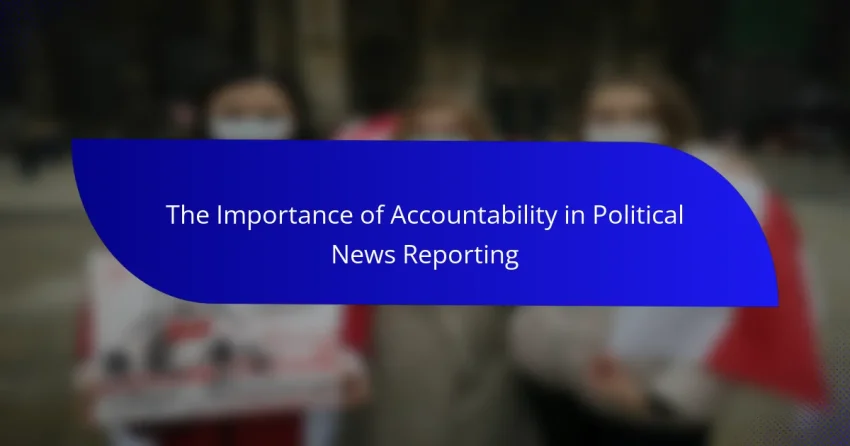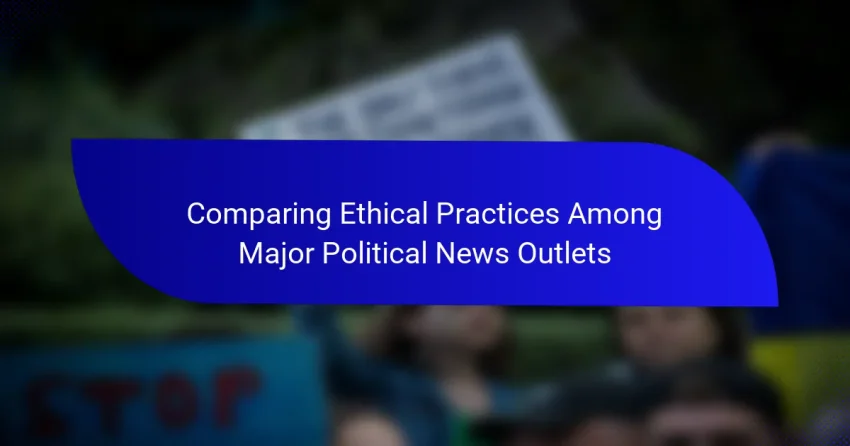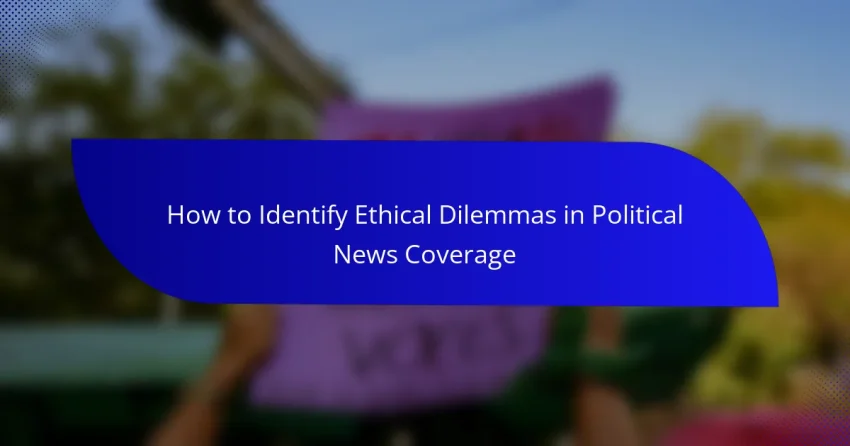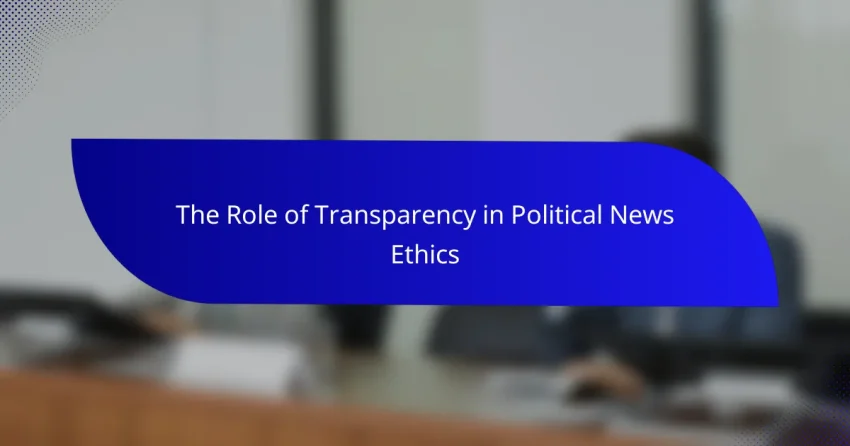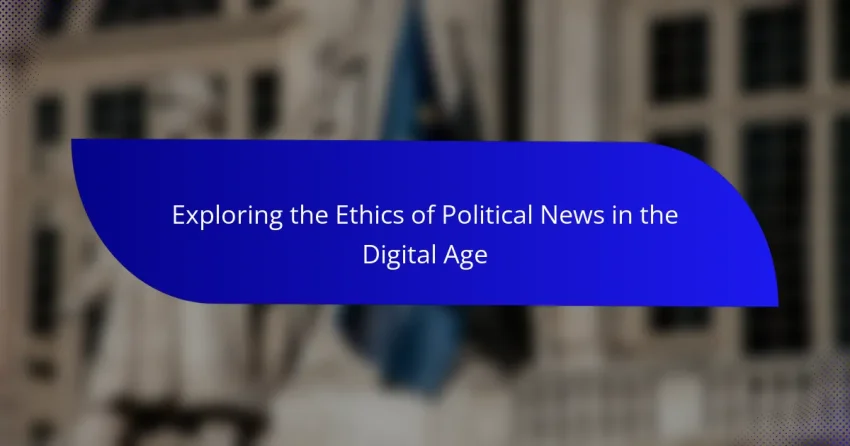Accountability in political news reporting is vital for maintaining ethical standards and delivering accurate information to the public. By fostering trust between the media and society, it plays a crucial role in supporting a healthy democracy. Journalists and media organizations must implement rigorous fact-checking and transparent reporting practices to uphold this accountability and ensure that…
Category: Political News Ethics
Ethical standards in political news are essential for maintaining integrity, accuracy, and fairness in reporting. By adhering to established editorial guidelines and training journalists on ethical practices, news outlets can foster trust and accountability with their audience, ultimately promoting responsible journalism. Unethical reporting can have serious consequences, undermining public trust and impacting the democratic process.
Comparing Ethical Practices Among Major Political News Outlets
In the realm of political journalism, major news outlets like The New York Times, The Guardian, NPR, BBC News, and Reuters are often held to high ethical standards that prioritize accuracy, fairness, and transparency. However, the implementation of these ethical practices can vary significantly among them, influencing their credibility and the trust they garner from…
How to Identify Ethical Dilemmas in Political News Coverage
Identifying ethical dilemmas in political news coverage is essential for understanding the integrity of information presented to the public. Key indicators include bias, sensationalism, and the credibility of sources, all of which can distort perceptions and mislead audiences. By recognizing these issues, journalists can uphold ethical standards that promote accuracy, fairness, and accountability in their…
Navigating Conflicts of Interest in Political News Analysis
Navigating conflicts of interest in political news analysis is crucial for maintaining journalistic integrity and ensuring accurate reporting. By closely examining the relationships and financial ties that may influence coverage, stakeholders can identify potential biases that compromise objectivity. Implementing strategies that promote transparency and independence can help mitigate these conflicts, fostering a more balanced media…
Understanding Ethical Standards in Political News Reporting
Understanding ethical standards in political news reporting is essential for ensuring that journalists deliver accurate, fair, and responsible coverage of political events. These standards not only help maintain credibility but also foster trust between reporters and their audience, ultimately contributing to an informed citizenry. What Are the Ethical Standards in Political News Reporting? Ethical standards…
The Role of Transparency in Political News Ethics
Transparency plays a crucial role in enhancing the ethics of political news by building trust and accountability between journalists and their audience. By openly communicating their sources, methods, and potential biases, news organizations empower the public to engage with information critically and thoughtfully. This commitment to transparency not only strengthens the integrity of reporting but…
Exploring the Ethics of Political News in the Digital Age
In the digital age, the ethics of political news face significant challenges, including the proliferation of disinformation and the erosion of public trust. The rapid dissemination of information through digital platforms not only affects democratic processes but also complicates the responsibilities of journalists to maintain accuracy and transparency. As social media shapes public discourse, understanding…
What Are the Ethical Standards in Political News?
Ethical standards in political news focus on maintaining integrity, accuracy, and fairness in reporting. These principles guide journalists in their efforts to inform the public while upholding trust and accountability.
Accuracy and Fact-Checking
Accuracy is paramount in political news, as misinformation can significantly influence public opinion and policy. Journalists must verify facts through reliable sources before publication, ensuring that statements and claims are supported by evidence.
Fact-checking should be a systematic process, often involving cross-referencing multiple sources and consulting experts. A common practice is to use fact-checking organizations to validate contentious claims, which helps maintain credibility.
Transparency in Sources
Transparency involves clearly identifying sources of information to allow readers to assess credibility. Journalists should disclose whether sources are anonymous, expert, or public figures, as this context can impact the perceived reliability of the information.
Providing links to original documents or studies can enhance transparency. When using anonymous sources, it is crucial to explain why anonymity is necessary, which helps build trust with the audience.
Impartiality and Fairness
Impartiality and fairness require journalists to present multiple viewpoints, especially in politically charged topics. This means avoiding bias by giving equal weight to opposing perspectives and not favoring one side over another.
To achieve fairness, journalists should strive for balanced reporting, which includes seeking out diverse voices and perspectives. A useful approach is to include counterarguments and responses from all parties involved, ensuring a comprehensive view of the issue at hand.
How Can Political News Outlets Ensure Ethical Reporting?
Political news outlets can ensure ethical reporting by adhering to established editorial standards, training their journalists on ethical practices, and implementing accountability measures. These steps help maintain credibility and trust with the audience while promoting responsible journalism.
Implementing Editorial Guidelines
Editorial guidelines serve as a framework for ethical reporting, outlining the standards and practices that journalists should follow. These guidelines typically cover aspects such as accuracy, fairness, and impartiality, ensuring that news coverage is balanced and well-researched.
Outlets should regularly review and update their editorial policies to reflect changes in the political landscape and societal expectations. For example, guidelines may include protocols for sourcing information, verifying facts, and disclosing conflicts of interest.
Training Journalists on Ethics
Training programs for journalists are essential for fostering a strong understanding of ethical reporting. These programs should cover topics such as media bias, the importance of fact-checking, and the implications of misinformation.
Workshops and seminars can be effective in reinforcing ethical principles, allowing journalists to engage in discussions about real-world scenarios. Regular training helps journalists navigate complex political issues while adhering to ethical standards.
Establishing Accountability Mechanisms
Accountability mechanisms are crucial for ensuring that political news outlets uphold their ethical commitments. This can include establishing internal review boards or ombudsman roles to address complaints and evaluate reporting practices.
Outlets should also encourage audience feedback and provide transparent processes for correcting errors. By actively engaging with the audience and addressing concerns, news organizations can build trust and demonstrate their commitment to ethical journalism.
What Are the Consequences of Unethical Political Reporting?
Unethical political reporting can lead to significant consequences, including loss of trust, legal issues, and the spread of misinformation. These repercussions not only affect journalists and media organizations but also have broader implications for democracy and public discourse.
Loss of Credibility
When political reporting lacks ethics, it can severely damage the credibility of the media outlet involved. Audiences may become skeptical of all information presented by that outlet, leading to a decline in viewership and trust.
For example, if a news organization is caught fabricating quotes or misrepresenting facts, it may take years to rebuild its reputation. This loss of credibility can extend beyond the specific outlet, impacting public trust in journalism as a whole.
Legal Repercussions
Unethical political reporting can also result in legal consequences, including lawsuits for defamation or libel. Journalists and media organizations may face financial penalties if they publish false information that harms an individual’s reputation.
In some jurisdictions, there are specific laws governing journalistic standards. Violating these can lead to regulatory actions, fines, or even criminal charges, depending on the severity of the unethical behavior.
Public Misinformation
One of the most damaging effects of unethical political reporting is the spread of misinformation. When false or misleading information circulates, it can shape public opinion and influence political decisions based on inaccuracies.
For instance, if a news report inaccurately portrays a political candidate’s stance on an issue, voters may make decisions based on that misinformation. This can undermine democratic processes and lead to a misinformed electorate, which is detrimental to society as a whole.
How Do Different Countries Approach Political News Ethics?
Countries vary significantly in their approach to political news ethics, influenced by cultural, legal, and historical factors. These differences shape how journalists report on political matters and how audiences perceive the integrity of news sources.
United States Ethical Standards
The United States relies on a combination of self-regulation and journalistic codes of ethics, primarily established by organizations like the Society of Professional Journalists (SPJ). These standards emphasize principles such as accuracy, fairness, and independence, guiding journalists to avoid conflicts of interest and to disclose sources when appropriate.
In practice, U.S. media outlets often implement internal guidelines that reflect these ethical standards, but enforcement can vary widely. For example, while some organizations maintain strict adherence to these principles, others may prioritize sensationalism or partisan reporting, leading to ethical dilemmas.
European Union Regulations
The European Union has established various regulations that govern media practices across member states, focusing on protecting freedom of expression while ensuring accountability. The Audiovisual Media Services Directive (AVMSD) is one key regulation that addresses issues like misinformation and political advertising, requiring transparency in funding and content.
Additionally, many EU countries have their own national laws that complement these regulations, often mandating ethical standards for political reporting. For instance, some countries require journalists to disclose their sources or provide balanced coverage of political parties during elections.
Comparative Analysis of Global Practices
Globally, approaches to political news ethics can differ dramatically. In some countries, such as Canada and Australia, ethical guidelines are similar to those in the U.S. but may include additional legal protections for journalists. In contrast, nations with authoritarian regimes often impose strict censorship, limiting journalists’ ability to report freely on political matters.
Comparative studies reveal that while democratic nations tend to favor transparency and accountability, the enforcement of ethical standards can be inconsistent. For example, countries like Sweden and Norway rank high in press freedom and ethical journalism, while others may struggle with issues like state control over media, impacting the overall integrity of political news reporting.
What Role Do Social Media Platforms Play in Political News Ethics?
Social media platforms significantly influence political news ethics by determining what content is shared and how it is moderated. Their policies shape public perception and can either promote transparency or contribute to misinformation.
Content Moderation Policies
Content moderation policies are the guidelines that social media platforms use to manage the information shared on their sites. These policies can vary widely, from strict bans on hate speech to more lenient approaches that allow for a broader range of political expression. Understanding these policies is crucial for users who want to navigate political news responsibly.
For example, platforms like Facebook and Twitter have implemented community standards that outline what constitutes acceptable content. Users should familiarize themselves with these rules to avoid sharing content that may be flagged or removed.
Impact on Public Discourse
The moderation of political content on social media can significantly impact public discourse by shaping the narratives that dominate conversations. When platforms prioritize certain types of content, they can amplify specific viewpoints while marginalizing others, leading to a skewed public understanding of political issues.
Moreover, algorithms that promote engagement can inadvertently favor sensational or misleading information, which may distort the quality of political discussions. Users should critically evaluate the sources of their information and seek diverse perspectives to foster a more balanced discourse.
Accountability for Misinformation
Accountability for misinformation on social media is a pressing concern in political news ethics. Platforms are increasingly held responsible for the spread of false information, leading to calls for greater transparency and corrective measures. This includes labeling misleading content and providing users with fact-checking resources.
Users can play a role in this accountability by reporting false information and supporting platforms that prioritize ethical standards. Engaging with verified sources and being vigilant about the information shared can help mitigate the effects of misinformation in political discussions.
How Can Readers Identify Ethical Political News?
Readers can identify ethical political news by assessing the credibility of sources and recognizing potential biases in reporting. Understanding these elements helps ensure that the information consumed is accurate and fair.
Evaluating Source Credibility
To evaluate source credibility, consider the reputation of the news outlet, the qualifications of the journalists, and the presence of editorial standards. Established organizations with a history of responsible reporting are generally more reliable than lesser-known sources.
Check for transparency in reporting, such as citations of original research or expert opinions. Ethical news sources often provide links to their sources, allowing readers to verify information independently.
Recognizing Bias in Reporting
Recognizing bias in reporting involves analyzing the language used, the framing of issues, and the selection of stories. Look for emotionally charged language or one-sided narratives that may indicate a lack of impartiality.
Consider the diversity of viewpoints presented in the coverage. Ethical reporting typically includes multiple perspectives, allowing readers to form a well-rounded understanding of the topic. A good practice is to cross-reference news from various outlets to identify discrepancies and biases.
